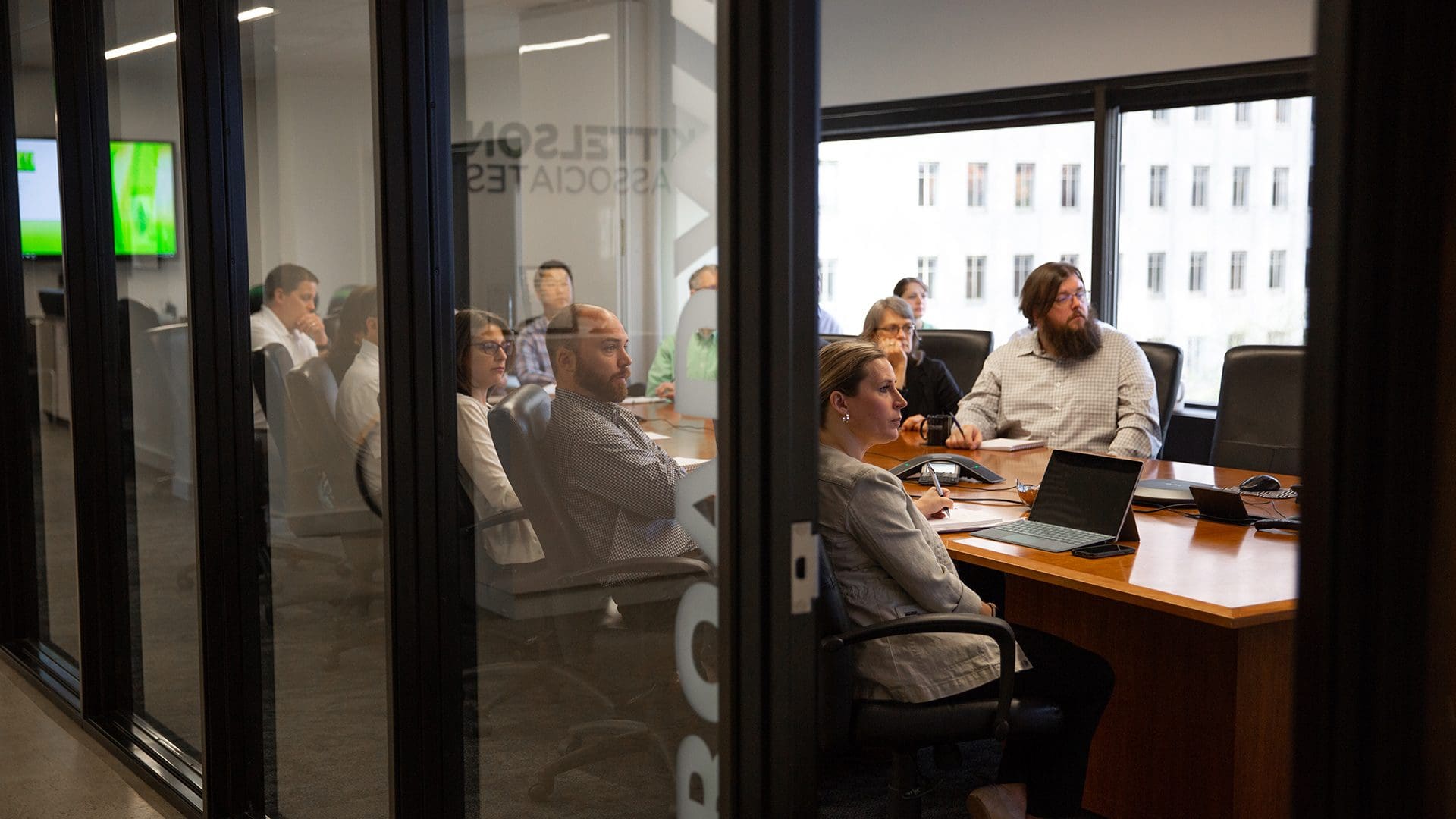April 24, 2019
Tips for collaboration between marketing coordinators and technical staff
What needs to happen for marketing activities to get the attention and momentum they need in a technical firm?
We’re not proposing there’s only one answer to the question, but there’s been one principle that’s made the difference for us, and that’s having a marketing mindset ingrained in company culture.
Here at Kittelson & Associates, Inc., when we say marketing mindset, we mean encouraging all staff (no matter how young) to keep their eyes open to the transportation needs and challenges communities face. When we feel our staff’s passion, interests, and experience can solve one of those challenges, a marketing mindset helps us clearly communicate what we do and why we care. This is how we build lasting and genuine relationships over time, and it’s a responsibility we all strive to hold.
Sharing this mindset is not only critical for the growth of our firm and our profession, but it sets the stage for more dynamic collaboration among our marketing coordinators and technical staff.
A firmwide ownership of marketing leads to better support of the marketing coordinators who channel our thoughts and passions into practical materials.
We’ve had successes and failures, and we’ve learned a lot along the way. We believe the best thing to do with lessons is to share them, so here is our best advice for both technical staff and marketing coordinators as you explore what collaboration looks like in your own firm.
For Technical Staff:
1. Take on the marketing mindset.
If you see “marketing” as just an activity for marketing coordinators or senior staff, you’re in danger of underestimating what it takes to put a competitive proposal together, and of missing opportunities for your own personal growth and development.
At Kittelson, this mindset grows through mentorship, training, communication, and staff autonomy to pursue their passions and interests. For instance, entry-level staff engage in tracking leads, supporting proposal development, and leveraging their professional network to support our business development strategy, while providing them with learning and growth opportunities.
2. Involve marketing coordinators in the project pursuit process as much as possible.
The earlier a marketing coordinator is aware of an opportunity, the better your final product will be, and the smoother the process. Take the time to share in detail why you are pursuing the opportunity, and what makes your firm the right fit.
This cannot happen through a one-time email with a few bullet points. Principal Engineer Andy Daleiden reflects on a roundabout peer review contract Kittelson pursued with Iowa DOT in 2018-2019. Although the proposal submittal deadline was the beginning of January, Andy and Senior Marketing Coordinator Nancy Marshall kicked off discussions in the fall. This gave Nancy plenty of time to talk to staff across the firm who had insights and qualifications to share, and it allowed for sufficient back-and-forth dialogue among Nancy, Andy, and others.
“Not only did we win the contract with a score of 94.3 out of 100, but neither Nancy nor I had to spend our winter holidays working on the submittal,” says Andy. “That was a win all around!”

Project managers and marketing coordinators discuss potential project opportunities in a business development meeting.
3. Remain focused on the needs in your profession.
The only way we can help our clients overcome real transportation hurdles and affect lasting change is to keep our eyes open to the needs around us, and genuinely listen to the communities we’re serving. Staff at Kittelson have full autonomy to pursue the projects that tap into their personal passions and the ways they want to see the profession help people.
Whenever one of our staff identifies a project opportunity, we send a message out to the entire firm so that staff in any of our 25 offices can speak up if they want to be a part of the pursuit process and ultimately, on the project team. This collective passion, coupled with our firmwide growth mindset, ignites meaningful collaboration.
For Marketing Coordinators:
1. Learn the technical side of the field.
Say yes to growth opportunities that help you expand your technical knowledge of the industry – whether it be classes, conferences, webinars, technical groups, or in Nancy’s case, becoming certified as a drone pilot!
Senior Marketing Coordinator Patty Post describes a measure she took in a prior role to get to know the industry. “Before I joined Kittelson, I worked for a firm that specialized in wastewater. I didn’t feel like I had enough working knowledge of the topics, so I decided to join a local technical group,” says Patty. “Boy, did I learn a lot about wastewater. I was a part of that group for 8 years and it grew my confidence with being able to describe and frame technical information in the proposals I created.”
2. Take initiative.
Set a tone for the type of collaboration you need in the proposal process. If you see something that could be improved, comment on it. If you see value in attending a meeting with a subconsultant, ask to be invited. If you need feedback, speak up – and follow up.
Suzie Lindstrom, marketing coordinator in our Florida region, encourages her marketing colleagues to initiate check-ins and frequent communication throughout the proposal process. “We make sure a kick-off meeting is organized to prepare and guide all of us in the proposal process,” says Suzie. “During this meeting, we clarify deadlines and responsibilities for all elements of the proposal, and talk about what we’re going to need from technical staff to put out a successful deliverable.”

Check-ins and frequent communication is an invaluable part of the proposal process.
3. Trust what you know.
You’re working with staff who have technical knowledge, but once you obtain the intel you need, you are the expert in clearly and genuinely describing how your approach will solve challenges and positively affect people’s lives.
Patty remembers many instances where she encouraged staff to better communicate their expertise. “We were pursuing a project involving corridor plans, and I was working with a national expert in access management,” says Patty. “I didn’t feel that he was being direct about his access management expertise, so we discussed ways to emphasize it more in the narrative.” By highlighting this unique area of expertise and combining it with other team elements, we submitted a proposal that resulted in us being selected for the project.
If you’re reading this, no matter which role you represent, you know that no staff member is an island. Marketing coordinators need information and involvement to carry out marketing activities most effectively; technical staff need the strategic lens and messaging capabilities of marketing staff. When the entire firm shares a desire for growth in the industry and lifelong learning, everyone’s contributions will be most fully valued.
The Bottom Line: Motivation Isn’t Manufactured
These are a few ways we strive to support and collaborate with our marketing staff – but the reality is a sense of belonging in a company, fulfillment in a position, and contributing positively to the shape of a community does not come from a formula. Recognizing the human desire behind a role is the first step to investing in your team in a meaningful way.
In his popular 2011 TedTalk, Dan Pink, former writer for Al Gore, describes three core concepts behind employee motivation: mastery, autonomy, and purpose. Give your marketing employees tools and support to master their craft; trust their decisions; and recognize the tremendous gift they’re bringing your firm through the work they do every day.
Patty describes where she finds long-term satisfaction in her role. “I’m contributing the firm’s prosperity, by helping to open doors for our engineers and planners,” she says. “As long as I’m working in a collaborative process, I’m influencing the direction our firm is going, and that’s really fulfilling for me.”
Of course, this process may look different for you than it does for us – and we wish you the best in it. For us, it’s always been a team effort, and it always has to be if we want to remain passionate and others-focused in the work we do. We love sharing knowledge and opening dialogue, so please reach out to us if you’d like to chat further!
